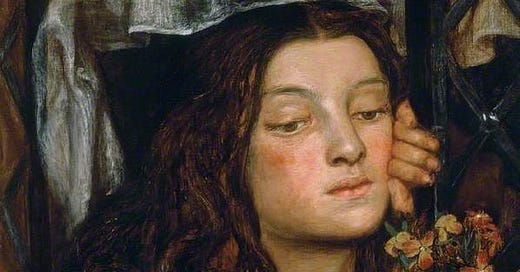The Girl at the Lattice
The window is small, only just shoulder-wide. In places the wooden frame has begun to warp, and there are signs the ironwork holding the diamond-shaped glass segments might be on the verge of failing. Two of the panes are cracked, yet not so catastrophically as to render them useless. Being deep-set into the thick wall, there is a kind of ledge on the outside of the window, one of sufficient girth as to permit the temporary housing of a vase within which a posy of small flowers is on the verge of turning.
Set slightly too high in the kitchen wall, in order to look out of the window she needs to stand on a small box; either that or kneel on her father’s large wicker chair which, if used for that purpose, needs to be dragged into position. If you look toward the house just now, she is there: head filling the open half of the window, her right hand resting on the ledge, her left clutching the frame of the closed part. Although you imagine she is holding that in order to steady herself (you cannot tell whether she is standing on a box or kneeling on the chair) there is — in her fingers’ grasp — something which suggests motivation beyond mere balance. Whether it is the grip of someone about to attempt the pulling back of the remainder of the window (though which, in fact, has been jammed for many years now) is entirely down to the interpretation of the viewer. As is the emotion in her eyes.
Cast slightly downward, one could be forgiven for making the assumption that she is looking at the vase and the posy in it — that is until you realise her gaze travels beyond those dying flowers to breach the walls of the house and head into the garden. All of which, for a girl of her age (what, perhaps fourteen or so — it is difficult to tell) would seem entirely appropriate; that is until you recognise her eyes’ slightly unfocussed far-away look. Not rapture as such, but she is clearly elsewhere. And when you partner that look with the way her hands are deployed, the notion of escape arises; not necessarily that she is about to rip the jammed window open and leap through the enlarged gap, but that she might wish she were able to. Or perhaps this is not an image of escape at all, but one of entrapment.
“Will you come away from that window, girl!” A voice — female, older — breaks beyond her and passes out into the garden. “These potatoes won’t peel themselves. I don’t know what’s wrong with you; you’re always away with the fairies.”
Impossible to tell whether or not the words have registered, it is a complaint which apparently goes unacknowledged; the girl does not move, continues to stare at some fixed point, virtual like her future. If you could step closer without disturbing her, without deflecting her from her reverie, you might find you were able to interpret the look in her eyes a little more accurately — for there is surely more to her story than conveyed in the position of her hands. However, you are near enough to recognise that she is gently leaning her head against the hand which holds the closed half of the window, and thus you rule out any notion of physical escape. There is a stillness about her — even in her hands it seems — which suggests nothing more than contemplation. But of what? Something she wishes for no doubt. Hers could be a look filled with the lovesick longing of youth; or, if not that, the desire for the return of another. Her father perhaps. Or even a brother gone off to war. You listen for further sounds emanating from the kitchen, for more clues; but all you can hear are the noises made by the other woman at her pots and pans, the accompaniment of a low chattering which is nothing more than her talking to herself.
Or is the girl imagining herself elsewhere, transported to a world divorced from the need to peel potatoes or peer through narrow kitchen windows. Can she see — somewhere between the sill and its posey and the garden beyond — a vision of that alternative place? And if so, what might she see herself doing there? Indeed, does she wish to be where we are, privileged enough to be able to look in, to observe, to draw our own conclusions? Perhaps in such an ambition we are no different to the girl.
A moment later she sighs, eases her head away from her hand, then takes the posey and drops it to the ground. With a final glance beyond where we are, she moves back into the kitchen taking the now empty vase with her.




